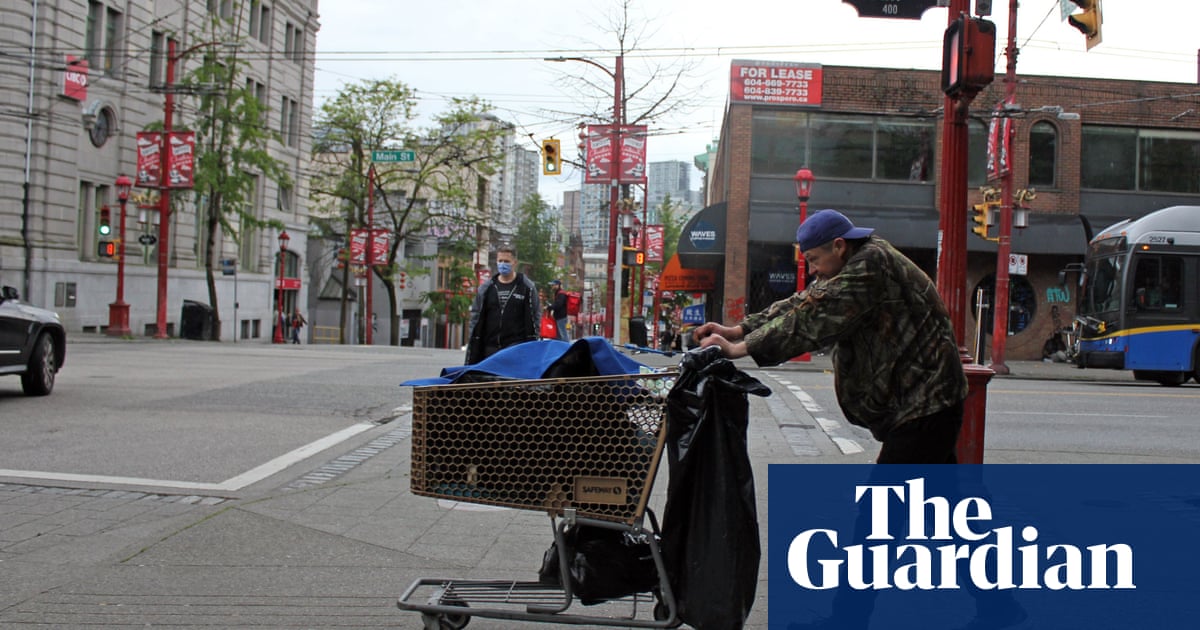The widely held stereotype that people experiencing homelessness would be more likely to spend extra cash on drugs, alcohol and “temptation goods” has been upended by a study that found a majority used a $7,500 payment mostly on rent, food, housing, transit and clothes.
The biases punctured by the study highlight the difficulties in developing policies to reduce homelessness, say the Canadian researchers behind it. They said the unconditional cash appeared to reduce homelessness, giving added weight to calls for a guaranteed basic income that would help adults cover essential living expenses.
Researchers at the University of British Columbia described in a report for Proceedings of the National Academy of Sciences how they tracked the spending of 50 people experiencing homelessness after they were given C$7,500.
The study built on a previous US survey of 1,114 people that tracked “public mistrust” in unhoused people’s ability to manage money, where participants predicted that recipients of an unconditional $7,500 cash transfer would spend most of it on “temptation goods” such as alcohol, drugs and tobacco.
The Canadian researchers followed up by actually giving that amount to 50 people who were homeless in Vancouver, and compared their spending with a control group of 65 homeless people who did not receive any cash.
They found the cash recipients each spent an average of 99 fewer days homeless than the control group, increased their savings more and also “cost” society less by spending less time in shelters.
“The impact of these biases is detrimental,” Jiaying Zhao, an associate professor of psychology at UBC who led the study, said in a statement. “When people received the cash transfer, they actually spent it on things that you or I would spend it on – housing, clothing, food, transit – and not on drugs and alcohol.”
Researchers ensured the cash was in a lump sum “to enable maximum purchasing freedom and choice” as opposed to small, consistent transfers.
Zhao said the study did not include participants with severe levels of substance use, alcohol use or mental health symptoms, because researchers felt those groups did not reflect the majority of homeless people.
“Rather, they are largely invisible. They sleep in cars or on friends’ couches, and do not abuse substances or alcohol,” said Zhao.
The study comes as lawmakers in Canada are under mounting pressure from advocacy groups to implement a universal basic income project that would help ease a cost-of-living crisis.
In 2017, the most populous province unveiled the Ontario basic income pilot, meant to study the effects of a universal basic income on 4,000 participants. The program was subsequently shut down by the province’s Progressive Conservative party after an electoral victory, with one minister calling the guaranteed funds a “disincentive” to work.
A bill is currently before the country’s senate to require Canada’s minister of finance to examine the idea of a nationwide basic income project and report on possible benefits.
I spent 5 years homeless in Toronto. The hatred and misunderstanding is obscene. Equivalent only to the lack of services to get out of homelessness.
People want to blame homeless folks for all their problems as if they’ve never needed help in their lives. When homeless folks ask for help they’re routinely denied because people think they know better.
The results of this study are not even remotely surprising. What is equally as typical is going to be all the responses of people arguing. Saying that it isn’t true or focusing on the exclusion of people with severe issues sayin that’s the majority of homeless people.
I got out through no help from anyone else and it almost killed me. Still haven’t recovered because I haven’t had the time because I have to constantly keep goin to extremes to provide the bare minimum. I have to walk with a cane. I also had to go dumpster diving this morning for breakfast.
Now imagine doing that every day for your entire life, pretty sure you’re never gonna escape, simply because everyone thinks you are a demon who designed your own personal hell.
The choice of it being given in a large sum is interesting. I recognize I have the bias of giving money to individuals with fear that it will be misused, but I do think it has to do with amount. If someone gave me $20 randomly, I’d be much more likely to impulse spend it than if I was given $1,000. With a large sum it feels more impactful to save/invest/pay bills than needing to contribute small amounts consistently.
I recognize I have the bias of giving money to individuals with fear that it will be misused
Your idea of “misuse” is irrelevant. Once you give someone money, it isn’t up to you what they do with it, and until you’ve lived their life you simply don’t have the ability to judge what is or isn’t “good” use of money. Either give, or don’t, but you don’t get to give and judge.
If someone gave me $20 randomly, I’d be much more likely to impulse spend it than if I was given $1,000.
but you don’t live on the street and are able to buy a night in a shelter and maybe a hot drink with that money. You are projecting how you think you would behave on a complete stranger you know nothing about other than that they’re struggling. Making helping them some “moral dilemma” is just making excuses not to help.
You’re not wrong. I am most certainly projecting how I believe I might behave given the situation. And I do agree with the idea that once you give something, it’s not up to you to decide how it’s used. Like the article is pointing out, these biases are frighteningly common that funds will be used in negative ways (drugs/alcohol).
I am, however, trying to paint a more “accurate” picture for how most people would be charitably giving/receiving (small denominations, namely). Would that change in amount be significant in how it is then utilized.
Imagine living in a society where you have to perform research to prove that helping people, helps people…
Oh, wait… 🤦♀️👏The best way to help people is to help people👏
It does, but they left out the mentally handicapped (that should not be homeless) and long term homeless.




